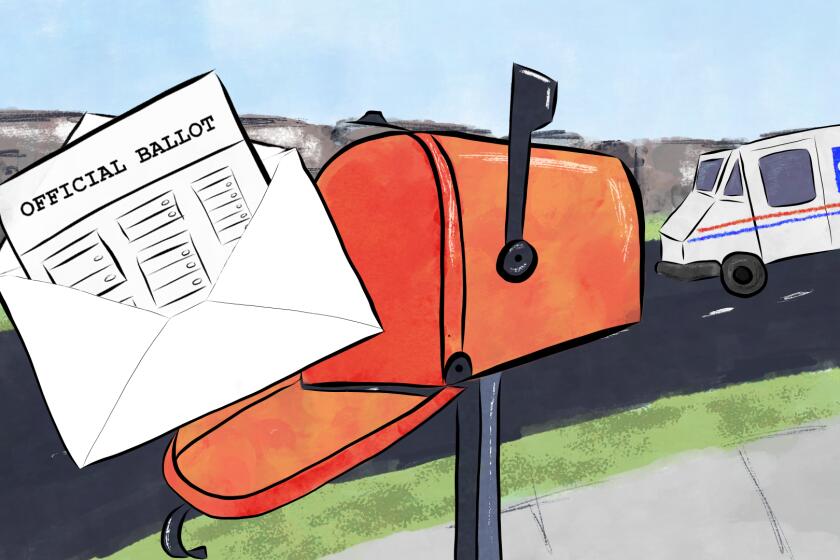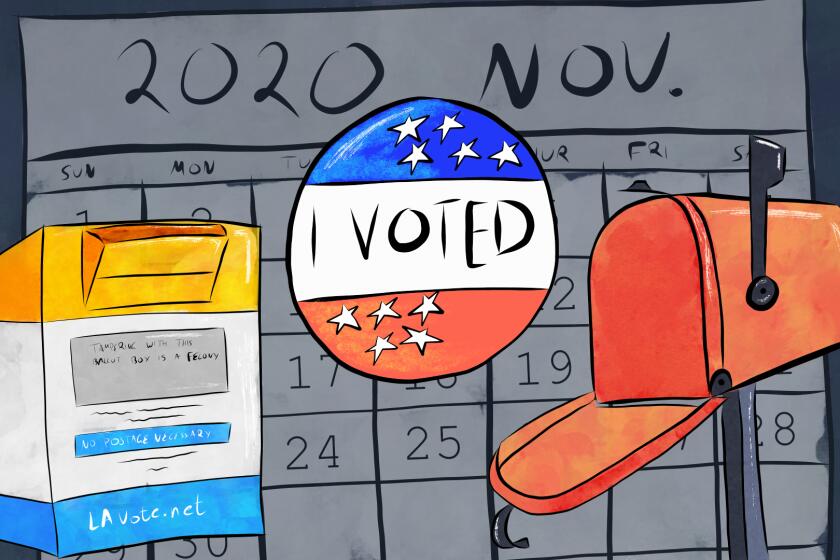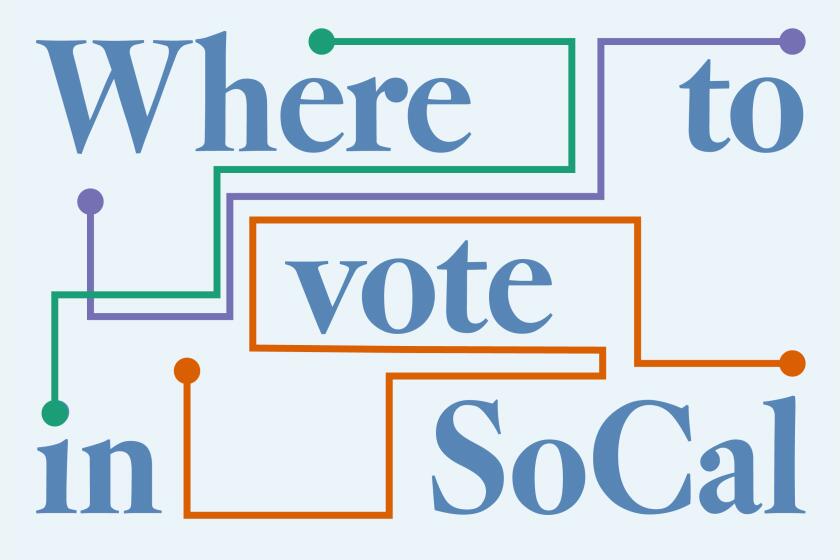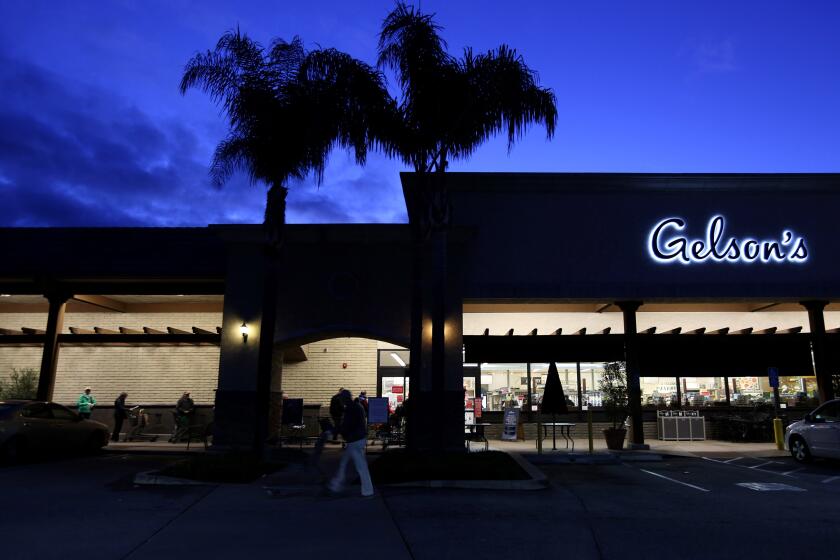Prop. 20 sparks debate over effects of criminal justice reform in California

- Share via
SACRAMENTO — As much of the country weighs changes to the criminal justice system, California has had a head start, adopting a series of laws in the last decade that, among other things, helped reduce the state’s prison population by more than one-third, or 50,000 people.
Now a group of prosecutors and law enforcement leaders has placed Proposition 20 on the November statewide ballot, which would expand the list of felonies for which the convicted are ineligible for early parole; increase penalties for repeat shoplifters; and collect DNA samples from adults convicted of some misdemeanors.
Proponents argue that it is needed to fix flaws in past measures that they say are putting the public’s safety at risk, including the early release of potentially violent criminals. But opponents of the measure, who include civil rights leaders, Gov. Gavin Newsom and former Gov. Jerry Brown, say it wrongly rolls back necessary criminal justice reforms as crime has declined in recent years.
“California is ahead of the game — we’ve done so many great reforms,” said Assemblyman Jim Cooper (D-Elk Grove), a retired sheriff’s captain and proponent of Proposition 20. “But there have been unintended consequences with these reforms.”
Brown, who led past reform efforts, called the initiative “very inhuman.” He said it takes away hope and incentives for prison inmates to pursue educational opportunities and demonstrate good behavior to improve their chances of getting out early.
“Proposition 20 is supported by a very narrow group of people who don’t accept even the modest prison reforms that I was able to achieve,” Brown said. “It’s driven by ideology and, in some cases, by a total lack of understanding of human nature and no sense of redemption or allowing people to put their lives on track. It’s vindictive.”
Brown was governor when the U.S. Supreme Court ruled in 2011 that California’s prisons were overcrowded in violation of constitutional protections. That year, he signed Assembly Bill 109 into law to reduce the state prison population by requiring that many people convicted of felonies not involving violence or sex offenses serve their sentences in county jails instead of state prison.
In 2014, California voters approved Proposition 47, which reclassified many lower-level drug and property crimes from felonies to misdemeanors. Before then, thefts could be considered a felony if stolen merchandise was valued at $450 or more, but Proposition 47 raised the threshold to $950.
Proposition 57, which Brown developed and was approved by California voters in 2016, increased parole and good behavior opportunities for those convicted of nonviolent felonies.
The new initiative to be voted on Nov. 3 makes key changes in the previous three laws.
The measure would broaden the list of crimes that make inmates ineligible for early release from state prison through the parole program in Proposition 57, adding 22 offenses, including trafficking a child for sex and felony domestic violence.
The measure also would increase penalties for people who commit multiple thefts, including serial shoplifting, to address a spate of such crimes, and would mandate the collection of DNA samples from adults convicted of crimes newly classified as misdemeanors under AB 109, including forging checks and certain domestic violence crimes.
In addition, Proposition 20 would require the state Board of Parole Hearings to weigh an inmate’s entire criminal history when deciding parole, not just the most recent offense, which was the standard set by AB 109.
Supporters of the initiative include the California Police Chiefs Assn., Orange County Dist. Atty. Todd Spitzer, Sacramento County Dist. Atty. Anne Marie Schubert and the union representing state prison guards.
“Prop. 57 was misleading because it promised that only ’nonviolent’ inmates would be released from prison early,” Citrus Heights Police Chief Ron Lawrence said. “But under California law, a number of violent crimes are classified nonviolent.”
Crimes that Proposition 20 would classify as violent, making them ineligible for early release, include felony assault with a deadly weapon, rape of an unconscious person, and human trafficking of a child, said Lawrence, past president of the California Police Chiefs Assn.
“Trafficking a human being for sex — that shocks the public conscience,” Cooper said. “You shouldn’t get out early.”
When campaigning for Proposition 57, Brown said that all sex offenders would be excluded from early release from prison, but a judge in 2018 ruled that many must be considered for earlier parole.
However, the case is pending review by the state Supreme Court, so no sex offenders have yet been released as a result of Proposition 57.
Brown said that although Proposition 57 allows a parole hearing for nonviolent offenders, most are not released. The board is made up of criminal justice experts, including law enforcement.
In July 2017, prison officials began referring inmates to the Board of Parole Hearings for early parole consideration under Proposition 57.
The board has reviewed 21,181 cases, with 3,797 inmates approved for release and 15,499 denied, according to state officials. Other cases were delayed or canceled, some because of eligibility issues.
Those released because of Proposition 57 include Armando Martín, who said he faced a nine-year prison term for narcotics and firearm possession. The 2016 initiative encouraged him to turn his life around and take education classes, he said, and he won parole last year after serving less than half of his sentence.
“When Proposition 57 came out, there was a light in the tunnel, there was hope,” the 45-year-old Los Angeles resident said.
Today, Martín has a unionized construction job and has been working on the new Rams stadium in Inglewood. He opposes Proposition 20, saying it will take hope away from inmates.
Proponents of Proposition 20 say that others released early have re-offended, with some committing nonviolent or misdemeanor crimes and others being sent back to prison for serious, violent offenses.
Ventura County Dist. Atty. Gregory Totten, who opposed Proposition 57, said that since its passage the Board of Parole Hearings has approved early release on parole for 79 inmates who came from his county.
Twenty-four of those parolees have allegedly committed new offenses, including residential burglary, identify theft, assault on a peace officer with a deadly weapon, elder abuse, automobile theft and possession of child pornography, said Totten, who supports Proposition 20.
None of the 24 parolees who re-offended were given early release for one of the crimes that Proposition 20 would put on the ineligible list, and the majority of new offenses were nonviolent crimes, including misdemeanor petty theft.
Out of 191 Sacramento County inmates convicted of felonies who were granted early release on parole under Proposition 57, the district attorney’s office said 55 were later arrested for committing new crimes, including sexual battery and robbery, as well as nonviolent offenses.
Proposition 20 is also supported by retail chains including Albertsons and Kroger, who say shoplifting and stealing by organized theft rings have been increasing. Safeway and other stores said in 2016 that shoplifting had increased at least 15%.
A number of California grocery store chains are pushing a ballot measure, Prop. 20, that would roll back recent criminal justice reforms.
The ballot measure would create a new felony for serial theft when a person is caught for the third time committing thefts valued at $250 or more, which Cooper said would serve as a deterrent.
The San Francisco-based Center on Juvenile and Criminal Justice, which advocates for reducing incarceration, estimates that, under Proposition 20, up to 9,900 arrests for theft-related offenses could be charged as felonies rather than misdemeanors each year.
The center said an estimated 66% of people sent to jail or prison under Proposition 20 would be Black, Latino, Asian or other Californians of color.
The new initiative also addresses a decline in the number of DNA samples taken after Proposition 47 reduced many crimes from felonies to misdemeanors, meaning those convicted were no longer required to provide DNA samples. Proponents of Proposition 20 say DNA samples collected from those convicted of theft and drug crimes can help solve other violent crimes, including rape and murder, sometimes decades later.
The number of DNA samples sent by California law enforcement agencies to the California DNA Data Bank has plummeted from 179,026 in 2012 to 105,890 last year, according to the state Department of Justice.
Based on the department’s data, Cooper estimates at least 2,000 more hits would be possible each year if DNA were still collected as it was before AB 109.
Not all prosecutors are on board with Proposition 20.
Opponents include Los Angeles County Dist. Atty. Jackie Lacey and the man running to take her place in the November election, former San Francisco County Dist. Atty. George Gascón.
“While I opposed Proposition 47 and 57, these measures were backed by California voters and must be given more time to be analyzed before a decision is made on rolling them back,” Lacey said.
Santa Clara County Dist. Atty. Jeff Rosen said past reforms have led to an ideal situation in which fewer people are in prison and crime has generally declined.
California’s rate for violent crimes, including murders and rapes, was 433 per 100,000 population last year, down from 470 a decade earlier, with a spike in 2017, according to the state Department of Justice.
Property crimes in California are also down from what they were a decade ago. The high for the decade was in 2012, when there were 2,772 property crimes per 100,000 population, and they were at 2,290 last year, according to the the department.
A June 2018 study by the nonpartisan Public Policy Institute of California found no evidence that violent crime increased because of Proposition 47, but some evidence that it affected property crime.
“While the reform had no apparent impact on burglaries or auto thefts, it may have contributed to a rise in larceny thefts, which increased by roughly 9 percent compared to other states,” the study said.
Rosen said Proposition 20 will require more money to keep people in jail or prison, taking funds away from programs that assist crime victims to recover from trauma and get jobs.
The state Legislative Analyst’s Office estimates Proposition 20 will increase state and local correctional, court and law enforcement costs by “tens of millions of dollars annually,” depending on the implementation.
More to Read
Sign up for Essential California
The most important California stories and recommendations in your inbox every morning.
You may occasionally receive promotional content from the Los Angeles Times.
















